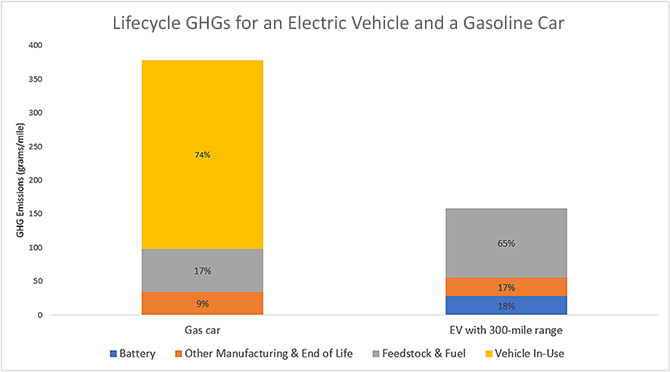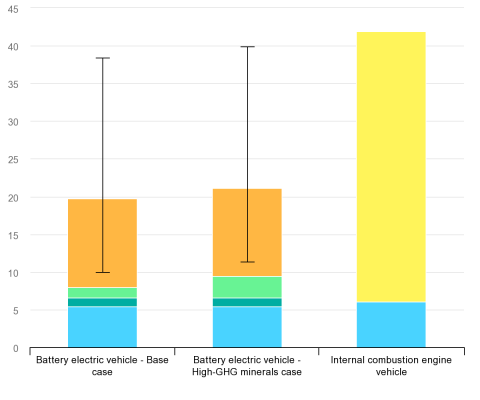Your view of the market has been skewed by your experience, which is not typical.
Since I made several well founded statements, not sure which you find so astounding.
I do not think that is a widely held view. Most EV owners do not own an EV as their primary driver, for range and cost reasons. Often these are second or third cars of relatively rich folks.
Once again, this is a pretty bold claim that needs some data backing. I couldn't find anything, which is why I provided anecdotal evidence to the contrary based on my observation from the most median EV buying population in the country. As you alluded to below, Tesla is by far the dominant EV brand... Most people buy Teslas. Tesla vehicles have nearly 300 miles to nearly 400 miles of range, very quick DC charging, a reliable and ubiquitous charging network. To say that most EV owners don't use them as primary vehicles due to range and costs? That doesn't make sense. The range of the vehicle and cost of "fuel" is definitely warranted for primary vehicle duties. I'm not saying you're wrong, but you need to point to some data because it just doesn't seem intuitively true. And even if you are somehow correct, it's not a knock against EVs, because they are more than capable of being the primary and only vehicle -- For most, they're even more convenient than a gasoline vehicle because of the ability to "refuel" at home.
And the idea that somehow these cars are combating climate change is at best mixed. First, they burn mostly fossil fuels. 2nd, the batteries require minerals strip mined overseas in conditions that would not meet US environmental or human rights standards, and mostly in countries not particularly friendly to us.
But let's start with a couple of them: electrical power in the US is primarily fossil fuels and nuclear. So your green car is burning that. It is just a fact.
You could look that up anywhere.
(bold emphasis mine)
You're so confident in making a statement about what "[MY] green car" burns? What is your definition of "well founded" if you simply make statements that you can't back up?
Electricity generation source varies wildly by region, but one trend is clear: renewables and zero-emission sources are becoming an increasingly-large portion of it everywhere in the US. Over the life of a vehicle (5-10 years), the grid will almost certainly be much "greener". Even a well-maintained gasoline engine is going to emit more as it ages. This is what MY state (California) looks like on average today:
https://www.epa.gov/egrid/power-profiler#/CAMX
Coal is 3.8%, Gas is 47.5%. The rest is non fossil fuels.
Furthermore, the energy provider for my county is Peninsula Clean Energy, which uses 0.0% coal and either 100% renewable or 50% renewable and 50% hydro. (
Source)
And, as you should well know, California, and the SF Bay Area especially has an extremely disproportionate number of EVs, especially Tesla. (
Source 1,
Source 2 - 2021 data, even better today)
California also has an extremely disproportionate amount of residential solar installed. At the end of 2022, solar accounts for 27.34% of the state's electricity. (
Source), and of course most residential solar is installed on the roofs of middle- to upper-class single-family homes, which, as you've alluded to below are likely EV owners, which makes it way more likely than average that an EV is powered nearly 100% by renewables.
So, most EVs in the US today are powered by much "greener" sources of electricity than you claim.
But all of that doesn't really matter in the end. What matters is the bottom line, and the bottom line is the vehicle's total carbon footprint taking everything (including battery manufacturing) into account. For an EV, the source of electricity feeds a highly efficient powertrain, so the carbon footprint beats an ICE in every reasonable scenario
And for that, we have a lot of "well-to-wheel" and "cradle-to-grave" studies to show that EVs have a much lower carbon footprint compared to ICE or even hybrid. Here is what our EPA data shows:
There are other sources that show the same. MIT Climate Portal:
Source
"Yes: although electric cars' batteries make them more carbon-intensive to manufacture than gas cars, they more than make up for it by driving much cleaner under nearly any conditions."
“We shouldn't claim victory that with this switch to electric cars, problem solved, we are going to have zero emissions,” he says. “No, that's not the case. But electric cars are actually much, much better in terms of the impact on the climate in comparison to internal combustion vehicles. And in time, that comparative advantage of electric cars is going to grow.”
"It’s difficult to find a comparison in which EVs fare worse than internal combustion. If electric vehicles had a shorter lifespan than gas cars, that would hurt their numbers because they would have fewer low-emissions miles on the road to make up for the carbon-intensive manufacture of their batteries. Yet when the MIT study calculated a comparison in which EVs lasted only 90,000 miles on the road rather than 180,000 miles, they remained 15 percent better than a hybrid and far better than a gas car."
Here's another: (
Source)
And Tesla-specific data from Tesla's latest impact report (they have figures for Europe and China as well): (
Source,
direct)
Secondly, Tesla has by far the greatest market share. According to market research, Tesla owners are on average white males with HH income of nearly $150k. Median HH income in the US is $67k. So the people making up most this market are quite well off.
https://hedgescompany.com/blog/2018/11/tesla-owner-demographics/
Consistent with that, the income limit on EV subsidies is at $300k per couple. Not exactly aimed at the poor or why is it so high? And why should average taxpayers be subsidizing this?
Subsidies for green energy are expected to total $1.2T according the a WSJ analysis. That is 3X the cost we were told when the bill was before Congress.
https://www.wsj.com/articles/inflation-reduction-act-subsidies-cost-goldman-sachs-report-5623cd29
It just makes you wonder why average taxpayers should be subsidizing this in a time of massive deficits.
I feel you're being a bit disingenuous here, but I 100% agree that the IRA bill was stupid. Still, subsidies are not an inherent fault of the EV, so it's kind of a misdirection tactic. I did not think the recent IRA incentives should've passed. I don't think it's fair to EVs or fair to American taxpayers. I personally feel there should be no incentives at all -- better than having these incentives with horrible qualification rules. I think a lot of the incentives are going to go to gasoline vehicles that have a small battery and sell as "plug-in" hybrid that qualify for the full IRA incentive. Manufacturers are incentivized to produce these small-battery hybrids because they are cheaper to produce than large-battery BEVs and still qualify for the full tax rebates. (Ex: A Pacifica Hybrid with only 32 miles of EV range, about 10% of most BEVs, gets the full $7,500)
As you've indicated Tesla has by far the greatest market share, yet nearly all Tesla vehicles ever sold never qualified for any US federal incentives because Tesla phased out in 2018 after their 200,000th vehicle sale (just as their volume started to pick up) and by July of 2019, that credit way only $1,875 and then disappeared completely. Model 3 & Y just started to qualify again under IRA in January of this year. So all those people that market research identified? Nearly all of them got little to nothing from the fed. Tesla has sold over 4 million vehicles -- only a small percentage ever qualified up to this point in time.
The IRA is weird, but I wouldn't knock the fact that it's not targeted at the "poor" because obviously if you target it at the poor, you're basically targeting no one as the poor can't really afford a new vehicle. For the "poor" they have an incentive for used vehicles, and the qualification there is $150k for married filing jointly. Honestly, though, your $150k dual-income household isn't very well off here in the Bay Area and will definitely struggle to afford a house in the poorer neighborhoods.
And there are long-standing incentives for fossil fuels as well, though they are sometimes vaguely defined and I'm not well versed in them. I am aware that fossil fuels are used to generate electricity too. Are you against fossil fuel subsidies?
I could go on of course but I will say Americans driving EVs makes little to no difference in worldwide carbon emissions. The reason why is emission growth is in India and China who are growing carbon emissions very rapidly and the EV has its own environmental footprint which is not zero.
From what I can tell, China is by far the largest emitter, but India is still little more than half of the US, so there is still plenty of impact for reduction here in the US. And China is a very, very large and competitive EV market, so I don't why you knock EVs just for Americans? This is a global effect and the manufacturers (especially the largest one, Tesla) sell globally.
(
Source)
Having said that, I think Tesla is an interesting company and most folks that own them seem to like them. But the massive subsidies are just not right in my view.
Agreed on the subsidies (remember Elon & Tesla were against them, but they don't make the laws/rules), but don't agree on your take that EVs have little-to-no positive environmental impact.






